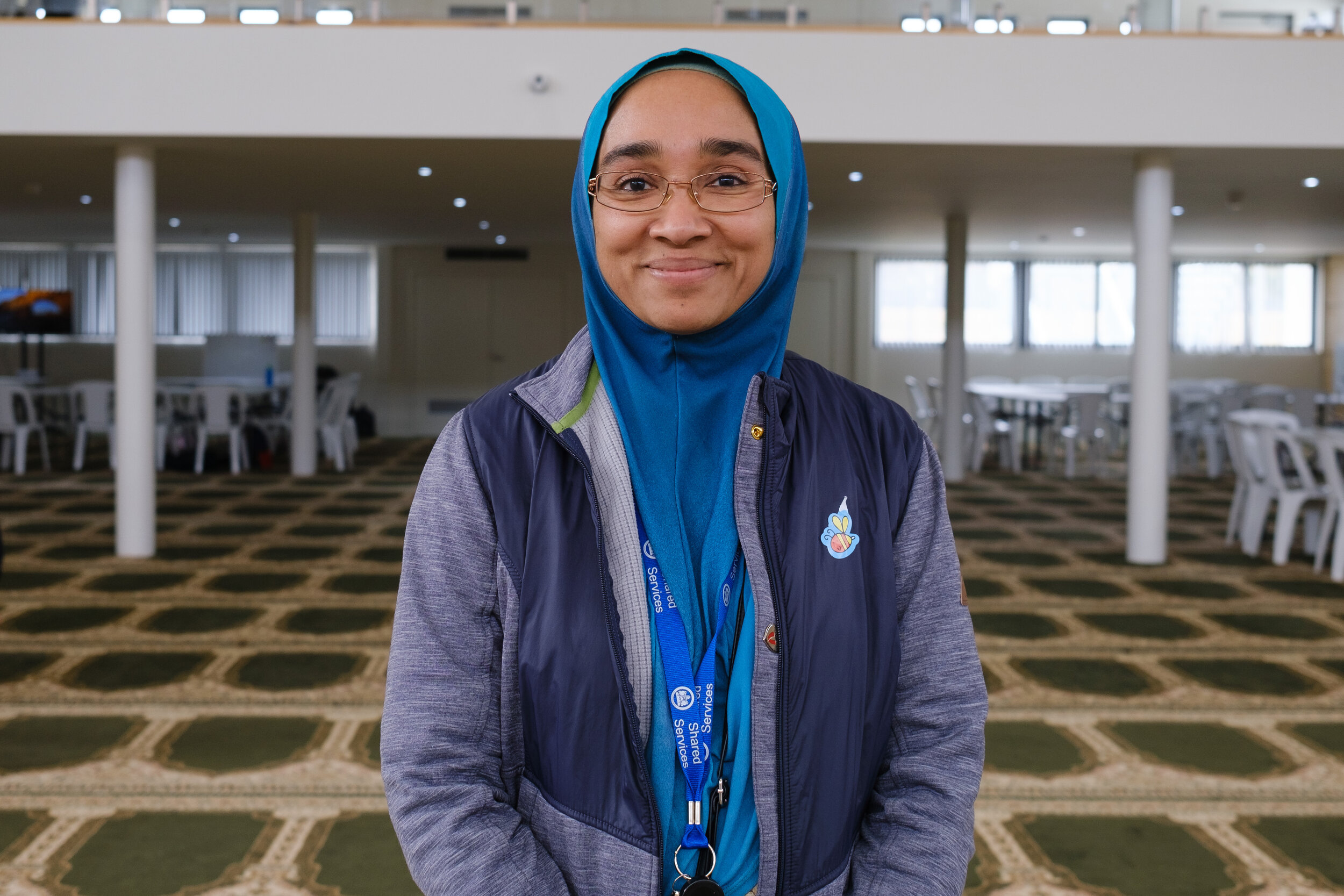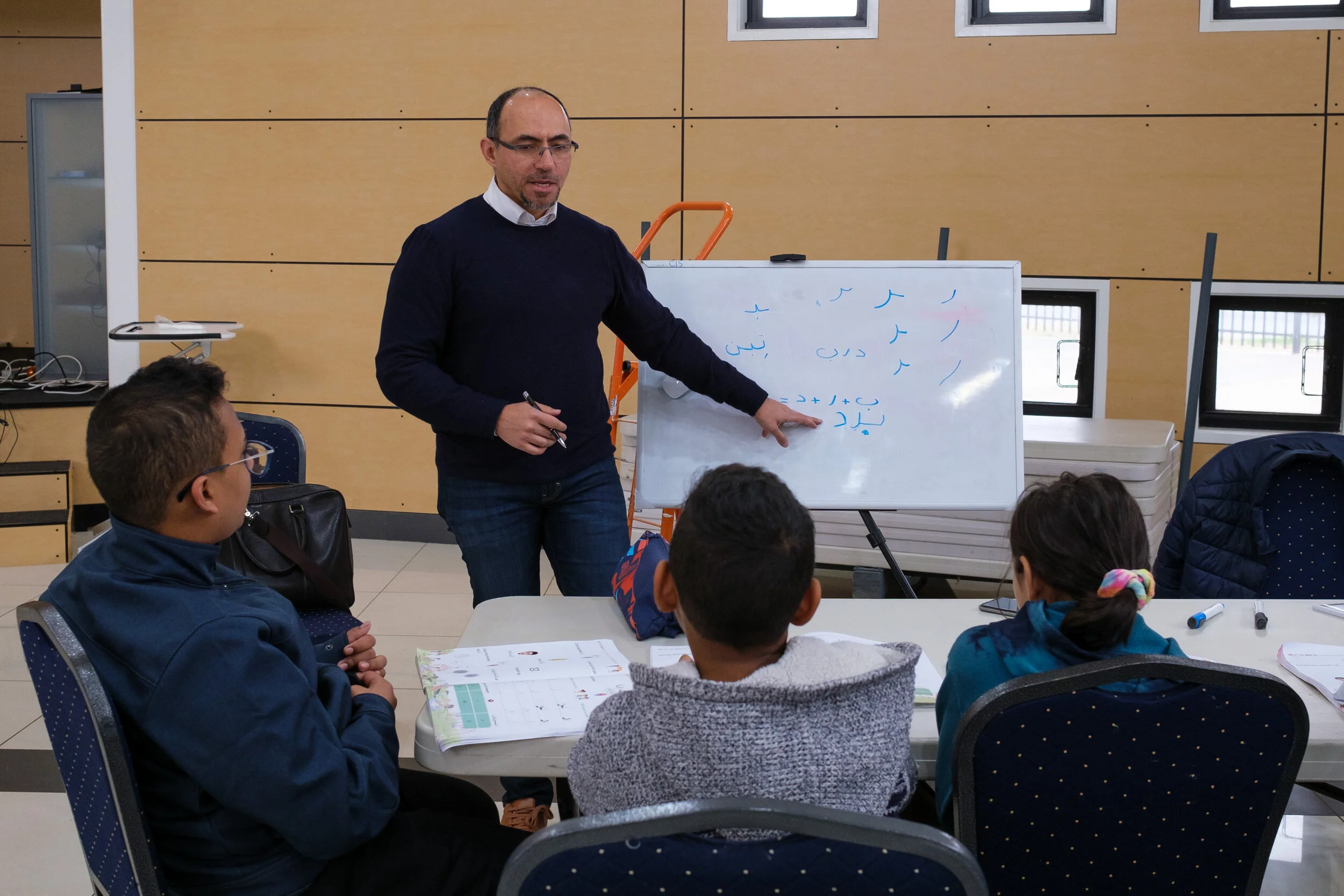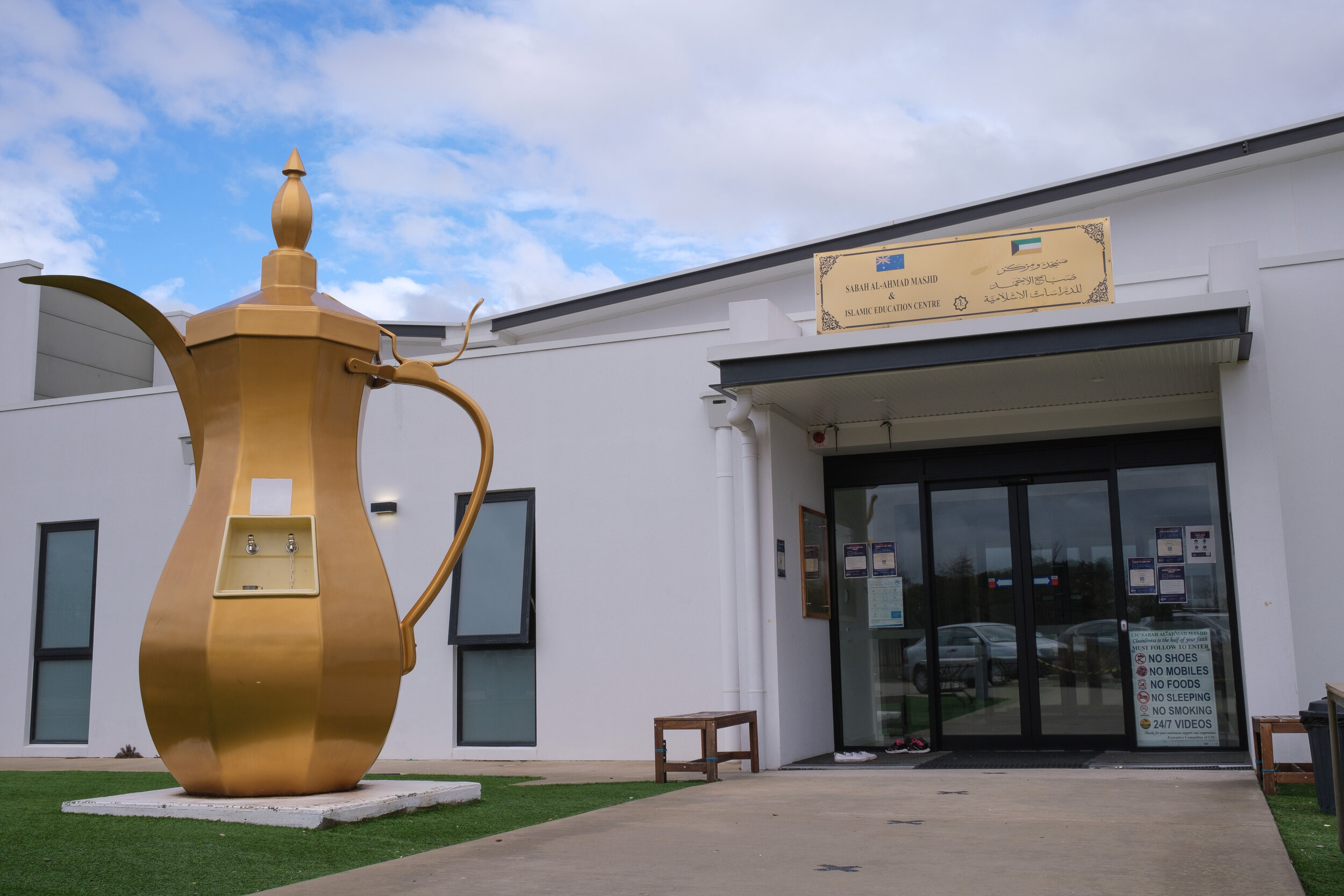
Good Human Beings
How dedicated volunteer educators are guiding
and supporting Canberra’s Muslim youth
It’s a cold and grey Sunday morning, heavy with the threat of rain. Inside the cavernous and ornate prayer hall of the Sabah al Ahmad Mosque mosque in Monash, a man walks along the walls turning on heating units one by one. A few other men arrange fold-out tables and stacks of plastic chairs, and set up whiteboards bearing half-rubbed out traces of their last use. Near the entrance to the hall, a trolley is stacked high with plastic tubs of coloured pencils, folders of worksheets, and a printer connected to a laptop.
As makeshift classrooms start to take shape, students arrive in ones, twos and threes, waving goodbye to their parents once safely inside. The kids take off their shoes, place them in a rack, and sit in small groups on the plush carpet talking quietly and giggling.
At exactly 10 a.m., a woman stands in front of the children with a microphone.
“As salam alaykum,” she greets them.
“Wa alaykum as salam,” they respond unconvincingly.
“Let’s try that again,” the woman says. “As salam alaykum!”
This time the kids are awake. “Wa alaykum as salam!” they reply in unison.
It’s Sunday morning and the students of Canberra Islamic School (CIS) are being lead in assembly by their Principal, Sumaiya Quasim.
“How was Eid?” Sumaiya asks them of the Eid al Adha holiday the week before. “Did you all have fun? Did you spend it with your family?”
After listening to tales of presents received and banquets enjoyed, Sumaiya asks for volunteers to stand at the front of assembly and recite prayers. Hands shoot into the air and half-a-dozen students take turns with the mic. Whenever one gets stuck on a line, parents at the side whisper the next words as a prompt.
Before splitting off for classes, two students volunteer to lead the school song. As everyone prepares to sing, a teacher steps up and addresses the group.
“Last week the boys were not loud enough. So, this week, insha Allah, we will be able to hear the boys.”

Sumaiya Quasim did not mean to lead an Islamic school.
When she and her husband moved to Canberra in 2005, they enrolled their five kids at CIS. Sumaiya intended to drop the kids at Yarralumla Mosque for their classes and use the time to get chores done, but it didn’t quite work out that way.
At the time, the school was short of teachers. Sumaiya had previously taught a few classes at a small, family-run Sunday School in Sydney so she volunteered to help out. By the end of the year, Sumaiya was teaching every lesson she could manage and was doing her best to bring order to an organisation lacking structure.
At the CIS AGM in early 2006, most members of the executive team resigned to move on to other projects. Recognising Sumaiya’s emerging leadership, the outgoing committee asked her to take over.
“I said, ‘no, I don’t do principal, I just teach!’ [but] there was no replacement for the committee — it was just me and other dedicated parents. Within two or three weeks, after much convincing, I stepped forward to lead the new committee.”
CIS had five teachers and about 70 enrolled students, although actual weekly attendance was closer to 20 or 30. There was no formal curriculum and no materials to support learning. Parents saw Sunday School as an opportunity for casual weekend childcare.
The school’s focus then was on teaching children to recite the Quran by rote. Sumaiya and the new committee noticed that to most of the students the Quran was little more that a string of sounds to be recited in prayer, bearing no relationship with the message of those words. This, she thought, was not the way to “communicate with Allah, with God.”
Sumaiya had no formal educational training but she was a fast learner. Through the Islamic book stores of Lakemba in Sydney, the committee researched text books and invested in a full set for each class level. Sumaiya and her colleagues wrote lesson plans and worked hard to make classes fun — if students didn’t even want to go, the school had fallen at the first hurdle.
It took a few years, but Sumaiya eventually convinced the other educators that teaching only memorisation of the text of the Quran in short, 45-minute classes was not going to produce great learning outcomes. With the staff on side, CIS shifted the focus of its Quranic education curriculum to promote a deeper, more contextual understanding of the text, and lesson plans were overhauled to make them more play-based and engaging.
As student numbers rose, Sumaiya and the committee worked hard to develop the teaching workforce in both number and capacity, believing that if the school invested in its volunteers, benefits would flow through to students. The relationship between school and families was formalised and clear expectations for attendance were set. Twice-yearly parent-teacher interviews allowed teachers to better understand their students’ needs and, in turn, empower parents.
Soon, CIS was pushing against the capacity limits of the Yarralumla Mosque and circumstances required a change of venue. In 2019, CIS moved its classes to Melrose High School where students and teachers enjoyed proper classroom facilities more conducive to learning but missed the atmosphere of the mosque.

And then, in early 2020, the COVID-19 pandemic struck. Like organisations around the country and the world, CIS found itself in uncharted waters. As Canberra settled into its first lockdown, CIS experimented with a series of sessions via Google Classroom to maintain a connection of sorts between CIS and families.
A small group of teachers put together hour-long workshops on topics like the prophets of Allah, Arabic, and Quranic memorisation. It turned out to be just the thing kids and families in lockdown needed. Students turned out in droves and joined the workshops seven days a week. Over the course of 2020, online CIS classes became an integral part of the kids’ pandemic routine. Sumaiya and the teaching team also benefited greatly from their crash course in using online education tools.
Having heard about the success of the CIS online learning program, another Sunday School based at the Canberra Islamic Centre (CIC) in Monash approached CIS and asked if their students could join the classes. After two terms of a joint CIS and CIC program, the two organisations decided that the CIC school should be formally incorporated into CIS. As part of the merger, CIS was invited to run classes out of the Centre’s premises which include a large community hall and the Sabah al Ahmad Mosque.
When COVID restrictions in Canberra were relaxed in late 2020, the newly enlarged Canberra Islamic School gathered at the Canberra Islamic Centre for a great big party. Places were strictly limited to ensure appropriate social distancing and tickets were snapped up minutes after release. It was the first time that many of the students had seen each other in person for months, and now they were back at a mosque.

After assembly, everyone breaks off into classes for the first lesson of the day. Students range in age from five-years-old to mid-teens, and most study three subjects: Quranic Studies, Islamic Studies, and Arabic Language. Classrooms are scattered around the perimeter of the mosque, inside a few small offices, and throughout the attached community hall.
As the students knuckle down to learning, a committee of parents set up a canteen to sell healthy, home-made treats at cost price in the breaks between classes. Outside, rugged up against a chill, volunteers wearing high-vis vests patrol the grounds to supervise children moving around the complex.
In addition to the 184 students enrolled at CIS (with 47 on the waiting list), there are 25 teachers. One of them is Ashrof Farouk. Ashrof was the principal of the CIC Sunday School which merged with CIS after the COVID-19 lockdown. Today, Ashrof is leading an Islamic Studies class for teenage boys. He talks with the young men about the basic tenets of the religion and how to apply them in contemporary life.
To Ashrof, his work and the work of CIS is crucial in preventing the retreat of these young Muslims into silos where they may be exposed to extremist thinking and a greater risk of radicalisation. Key to this mission is nurturing their attachment to a supportive mosque community through the Sunday School.
“If we can make better citizens, if we can make the children understand that there are many ways of doing the same thing. We live in a multicultural and multi-linguistic society where there are so many people with different opinions. We’ve got to respect their values. We’ve got to make sure that we adhere to our principles and values at the same time as we don’t brush things off — they’re our fellow human beings.”
Ashrof Farouk
Maryam Mansuri has been a member of the CIS family since she started as a student at about seven years-of-age. Maryam now volunteers as a teacher and is a member of the CIS executive while completing her undergraduate studies at university.
When asked why she volunteers, Maryam asks, matter-of-factly in return, why she wouldn’t.
“There’s a need … It doesn’t make sense that if there’s a need and you can do it, you don’t do it. I used to be those little kids so I feel like I understand them. I can communicate with them in a fruitful way.”
Like Ashrof, Maryam believes that institutions like CIS are critical for young Muslims.
“If they don’t have a situation in which they can be normal human beings, entirely, without being shy about any aspect of themselves, then they will hide it. And it’s a great loss if you feel the need to disconnect yourself from Islam. It causes great difficulties in a person’s mind and a person’s heart in the future.”
Another student-turned-teacher is Fatin Iszam. Fatin enrolled at CIS as a senior student in 2017 after her family arrived in Canberra from Malaysia on a diplomatic posting. She volunteered as a teaching assistant in 2019 and now leads Arabic Language and Islamic Studies classes.
Fatin wants to work as a pharmacist and is remotely studying allied health at a Malaysian university, but she loves teaching at CIS and plans to continue doing so until her family is brought home from Australia.

Fatin Iszam
Running CIS is a full time job and Sumaiya does it in any spare moments she can manage around her “real” job. By day, Sumaiya is a Research Assistant at the Centre for Conservation Ecology and Genomics at the University of Canberra; by night, she attends to the mountain of administration that keeps CIS running. The three hours of school on Sunday are when it all pays off.
CIS had a couple of very close calls in 2019 and 2020 with its departure from Yarralumla Mosque and the COVID-19 crisis. But to Sumaiya, the events of those years only reinforced the school’s importance. While closing down the school might have been the easy option, she says that doing so would have caused “serious damage” to the children and the community. Plus, there was a lesson about perseverance to be modelled to students.
“The youth are struggling with their identity. They don’t know where they belong. If they’re experiencing bullying or discrimination it challenges their religious identity because it’s so much easier to give it up and conform.”
CIS is as much a pastoral care organisation as it is an academic institution. And while the students’ academic performance is assessed and reported back to parents every second term, it is the less tangible outcomes of the program that primarily drive Sumaiya and her team.
“Most importantly, [we want our students] to be good human beings. You have to be a good human being before you can be a Muslim. You need to respect others and care for others to really understand God. Because it’s through our relationship with our peers and our parents and our elders and our teachers and our community, regardless of [who] they are, [that we] understand and appreciate those differences.”
As the final lesson of the day draws to a close, parents arrive to pick up their children. Some use the few minutes until class is dismissed to silently offer prayers at the front of the mosque.
Always busy but never rushed, Sumaiya stands to the side of the hall packing up materials as she talks with teachers and parents. 16 years ago, she meant to just drop off her kids and leave.
“Allah — God — has been very gracious with us. He has enabled us to do so much more than we ever anticipated.”

Good Human Beings
Words and pictures
Scott Bridges
Published
20 August, 2021










